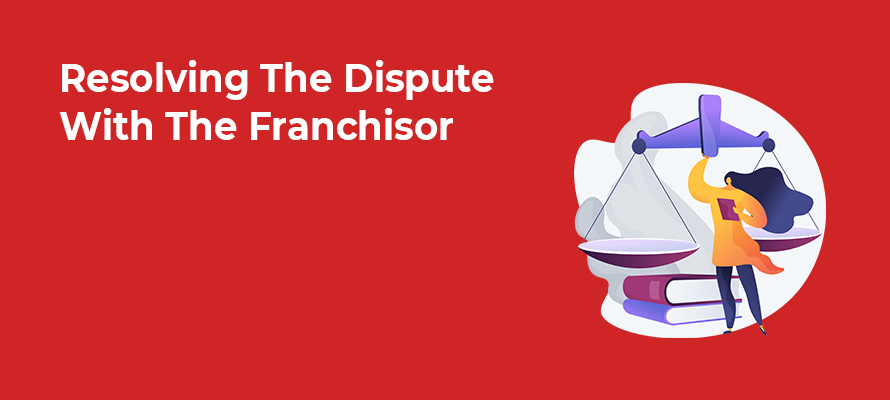Owning a franchise may be a very fulfilling factor; however, all this could come to a screening halt once a dispute arises. A difference between a franchisee and a franchisor isn’t a good sign for the expansion and development of business. A disagreement between the two parties may be a great distraction and may place the company at high risk.
Just in case a dispute arises, it’s smart to take steps with immediate effect to resolve the problems as this could save each party time and resources. As an administrator, it is wise to handle disputes with professionalism and integrity and fix them at very early stages. You should also be able to identify concerns that may bring about the conflict and come up with a method to curb them. Prevention is better than cure.
A dispute may arise as a result of:
- Breach of contract– If a party fails to adhere to the obligations set out in an agreement, it may lead to a conflict between the two parties.
- Poor quality services /goods– When the goods and services delivered/provided do not meet the standards stated in the agreement.
- When there is no proper or a total breakdown of communication.
- Economic factors -Changes in the economy or industry may bring about a crisis in a business system leading to a dispute between parties.
- Technical issues.
- Lack of respect and understanding.
These are a few of many concerns that can lead to a conflict when running a franchise business.
To avoid dispute in a business, you can take measures like:
- Read your contract thoroughly before signing it, to understand the terms and conditions required.
- Ensure proper communication systems to air out views and opinions among parties.
- Develop a professional relationship between parties, uphold respect between work parties.
- In case of economic changes come up with a system that will work in the unpredictable future of the business.
Definition of Terms
- Franchise- It is the authorization to sell, or carry out business using a company’s name. The person who carries out franchise purchases the authority from the company he intends to sell their products or services. He can either be distributing the same products or offering the same service.
- Franchisor- A franchisor may be a person or company that grants the license to a third party for the sole purpose of conducting business under their name. The franchisor owns all the rights of the corporate and allows franchisees to use these rights to operate their business.
- Franchisee- It is an individual, party, or business that purchases the franchisor’s authority to operate under their name in selling goods or offering services. The franchisee is charged by the franchisor to use his name, and an agreement is signed.
- Dispute- It is any disagreement between 2 parties over the terms of an agreement signed by each party concerned. They will happen in any business arrangement and square measure principally inevitable over a company’s period.
- Code of Conduct– Ethics sets in writing and are agreed upon and passed by the law. They lay down guidelines to be followed by parties carrying business together and govern a specific type of business. For instance, we have a Code of conduct governing partnerships agreement and franchise agreement. In the case of a legal procedure, the code of conduct will guide the process to be followed.
- Litigation- This is a lawful procedure of solving business problems or disputes between parties; they may be involved in doing business together or among sole individuals and organizations.
- Mediation- Use of an impartial and revered third person referred to as a mediator in settlement of a dispute, rather than choosing arbitration or judicial proceeding.
- Mediator- An unbiased third-party that facilitates a discussion between two or more parties in a dispute.
- Arbitration– Settlement of a dispute between parties while not resorting to court action. Unlike mediation in arbitration, a binding decision is made by the arbitrator as the final solution to the conflict.
- Franchise Agreement- It is a written binding document laying down rules, obligations, rights, and guidelines governing the running of a franchise and the relationship between the franchisor and franchisee. Both parties sign this agreement.
- Arbitrator- An independent third party, just like a mediator but an arbitrator makes the final decision after the discussion. His decision is final and enforceable by law.
Just like any other establishment, there should be internally developed procedures for handling disputes. These procedures should be set within the franchise agreement and will dictate internal dispute settlement mechanisms and when legal actions are to be taken.
This guideline ought to follow and meet the minimum requirements stipulated by the code.
The following are the main primarily measures considered when handling disputes.
- Code of procedure
- Legal proceeding.
Code of Procedure
This measure is the first approach advised in solving a dispute before it escalates. The code approach requires a complaint when writing to the other party. The claim should serve to notify them of a problem, outline the actions that are supposed to be taken, and the expected outcome. The two parties must work their differences and try to solve their dispute. If it is not possible, a third party is involved, referred to as mediation.
Mediation
If both parties can’t agree on a standard amicable way to resolve their dispute, a desire for mediation arises where they select a negotiant. This method involves a third party who is a professional mediator. The two disputing parties appoint the mediator if they can’t appear to agree on a negotiant, one will be selected to them by the code as stipulated.
Mediation is cost-effective and entitles each party to contribute to sinking the mediator’s costs. A negotiant ought to set a date for the meeting, place, and time. It is not his responsibility to offer any legal recommendations or create selections. Instead, his main work is to facilitate a structured meeting for the two parties to hold a reasonable conversation and hash out an acceptable outcome.
After a negotiant is appointed/chosen, a meeting is set. Either party should attend head to head or send representatives. Failure to attend or to send a representative a fine is charged with a certain percentage as set by the law guiding mediation. Throughout the negotiation, honesty is vital to succeeding in the desired resolution. You need to offer proof and records to substantiate any claims.
The decision should be approached in an exceedingly reconciliatory manner to shield their relationship and reputation. If you can’t resolve the dispute through mediation, it’ll resort to complicated and expensive action at law. Intervention might not be applicable in an exceeding state of affairs where urgent relief is required.
Arbitration
Just like mediation-arbitration involves a third party, the distinction is that arbitrators create a final judgment. Arbitration is dearer than mediation. The arbitrator’s call is final, binding, and enforceable. The application process outlined by law governs the arbitration enforcement in a country or state. Different countries have different procedures for handling arbitration.
Legal proceeding
It is also known as litigation or judicial approach. As the name suggests, this method involves going to court. This method is another approach, and most probably the last one to be considered in resolving franchise disputes. It is the main last remaining option when you have unsuccessfully tried to resolve through both mediation and arbitration method. In a judicial proceeding, the terms and provisions guide the actions taken of the franchise contract and agreement disputes.
Litigation is costly and entails lengthy court procedures and may take time for a final verdict to be delivered. Both parties will have to each have an advocate to represent them in court; hence they may face a financial strain in the process if they are not financially stable. It is highly recommended that they settle their dispute before it reaches this far.
The franchise contract and agreement disputes ought to address the subsequent concerns arising from breach of contract, disputes arising as a result of a change in the economy of a state, conflicts due to a weak communication system in a franchise among other critical problems that may arise in the future.
Following all the above discussions, you have the right to initiate legal proceedings irrespective of whether or not you select the former or the later procedure.
The litigation process can be expensive, uncertain, and stressful; it is wise to consider mediation or arbitration when resolving a dispute.
Conclusion
When a dispute arises, it is wise to talk to the other party as a first step, try and find an amicable solution. A disagreement is disruptive and can terribly affect a business if not well handled can lead to both bankruptcy and termination of the said business. Always put in the record all your interactions for future reference and evidence.
When getting into a mediation or arbitration process, prepare yourself psychologically and financially. It will be time-consuming and also will require money. One should keep an open mind and be willing to make adjustments; this will help to achieve or reach a timely solution.














